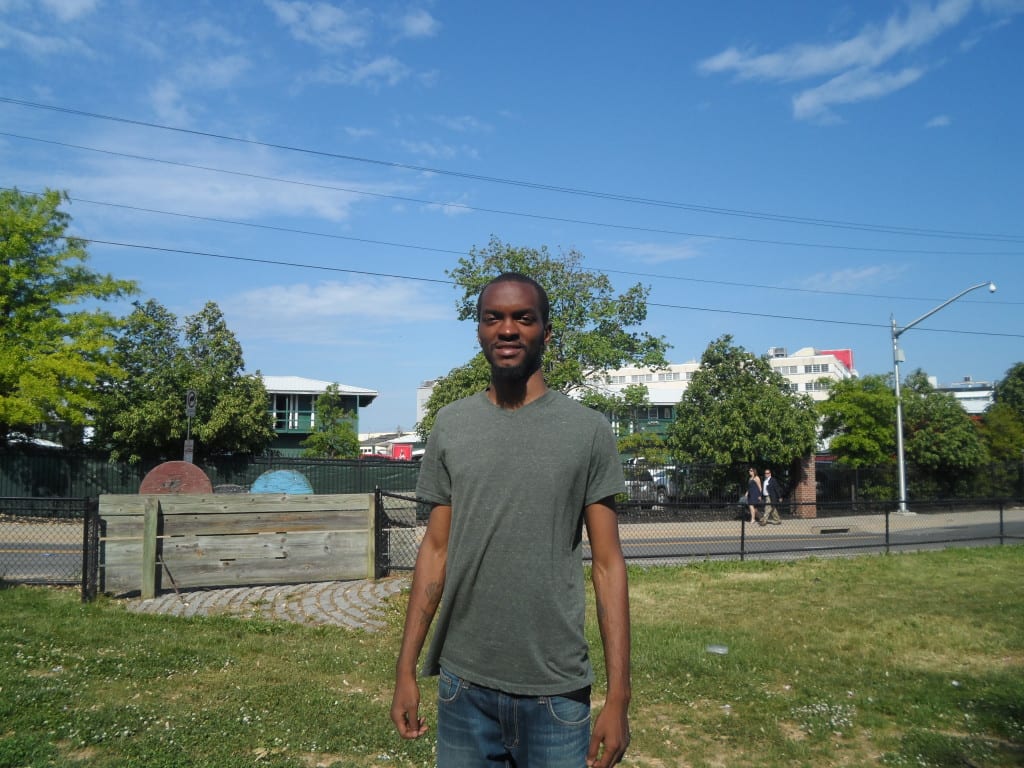
Aaron Dove stands outside of Pimlico. Photo by Teresa Genaro.
by Teresa Genaro
On the day before the Preakness, the streets around Pimlico Race Course were mostly quiet. A few residents were out selling water and trinkets, but aside from the main roads—Park Heights Avenue, Belvedere Avenue, Northern Parkway—the residential neighborhood sleepily enjoyed a perfect summer day, residents hanging out on their porches, sitting beneath trees, playing in playgrounds, gardening.
22-year-old Aaron Dove guided a visitor around the Garrison neighborhood, talking about life in Baltimore. He’s lived here his whole life, aside from a year at community college in Kansas. He ran track, a speedy, sprinting hurdler, at Carver Vocational-Technical High School, a little southeast of here. It was at Carver, recent three-time city champs in track and field, that he met Tony Pridgen, the high school track coach whom he calls his mentor.
A 2011 Baltimore Sun “notable,” Dove recently completed a Baltimore City construction training program, but has so far not found employment, even with the certifications he earned through the program, which paid participants as they learned. So when he heard that Pimlico was hiring for the Preakness, in the neighborhood in which he was born and to which he recently returned, he applied and was given a janitorial stint for the weekend.
His mother—he has a tattoo of her name on his left forearm–lives with him in a house that’s about a 15-minute walk from the track, and he has two younger brothers. An older brother was, he said, shot in the back of the head in 2006, the killers dumping the body in a dead-end street. Their incarcerated father was unable to attend the funeral.
He admits to “little hustles” in the years since he left Kansas, but has avoided the legal problems that kept his father in prison for much of his childhood.
An avid sports fan—the Ravens are his team—he wanted to study sports management at one point. Engineering also interested him, complementing the carpentry courses he’d taken in high school. He thinks he’ll go back to school at some point, and though he said that as a black man he felt like he had “a target” on him, he dismissed the criticism lobbed at the place he calls home.
“I’ve been here my whole life, and I’ve never had a gun pulled out at me,” he said. “I’ve never been stabbed. People say that they don’t like this area, but they don’t live around here, so they don’t have to worry about it.”
Fifteen hours later, as Dove prepared for his long Saturday shift, the tranquil Garrison neighborhood had sprung to life. Though hot and humid already at 9 am, the streets were lined with entrepreneurs and revelers, celebrating the party that had come to their neighborhood.
On the corner of Winner and W. Rogers, the convenience store did a brisk business, but not quite as brisk as a few years ago.
“When they stopped letting people buy liquor and take it inside, it hurt our business,” acknowledged the owner’s son, who preferred not to give his name. “But we still stock up on beer; passersby will buy one and drink it before they go in.”
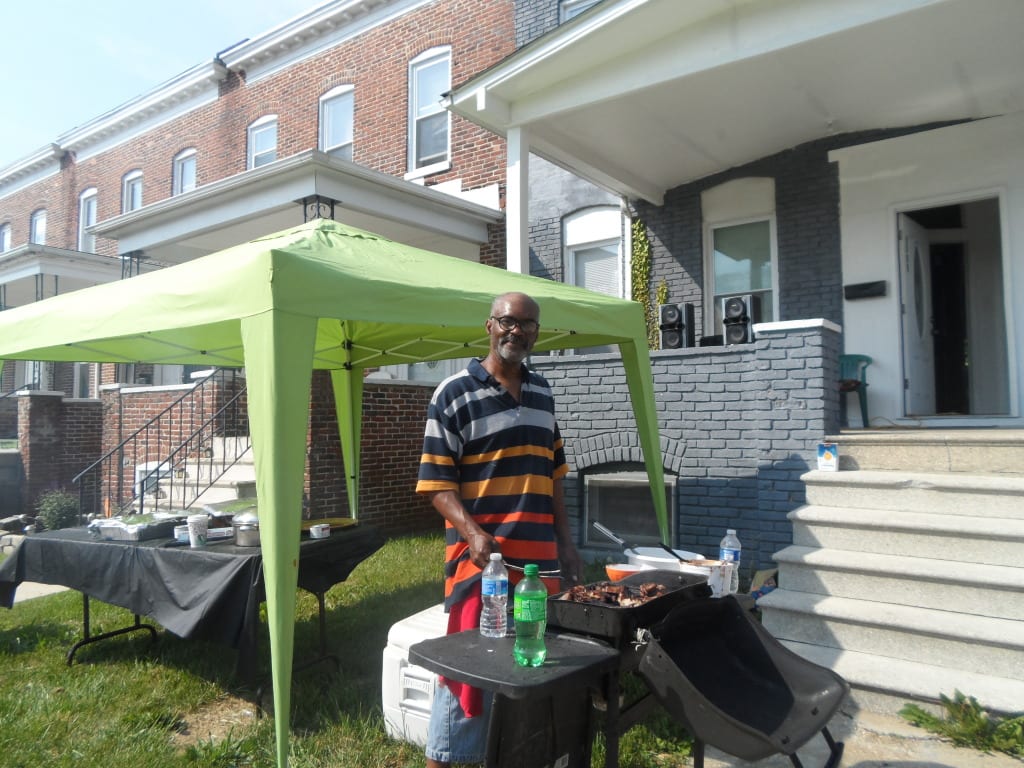
Mike Burnett cooking up some of the up to 50 pounds of chicken he’ll make on Preakness day. Photo by Teresa Genaro.
He was standing on the sidewalk, on a concrete lot behind the store, near a sign that advertises parking spaces for $40, waving in passing cars. It would be full, he said, around noon.
He and his family live south of Baltimore, in Anne Arundel County, and even though his parents work behind bullet-proof Plexiglas and the more expensive items in the store are behind the counter, he rejects the idea that the neighborhood is unsafe.
“You know what?” he said. “That’s false. This neighborhood is actually pretty good. The residents are very kind. We’ve been here for eight years, and that’s been my experience.”
A few feet down the block, Wonda Adams sat in a folding chair, a cooler alongside her, stocked with cold drinks and topped with various snacks.
“I’m selling things to raise money for my church,” she said. “Our women’s day is tomorrow and my goal is $450. I’m about $200 short.”
Her daughter owns a house around the corner, and this is the third year that she’s set up to raise money. She said that she usually makes around $250.
“When people find out I’m doing it for my church, they give me extra,” she said gratefully. “If they buy something for $2, they give me a $5 bill and tell me to keep the change. Some people just make a donation.”
A bit further down Winner Avenue, just beyond the playground at Pimlico Good Neighbor Park, Mike Burnett stands in his front yard grilling chicken. Lots of chicken.
“About 30 to 50 pounds,” he said, the lilt of the Caribbean still singing in the speech of the Brooklyn native.
He’s serving up a plate of jerk chicken, rice and peas, and cabbage, and before long, a man in a golf cart swings by, asking Mike to “hook him up.”
“For $10, I can hook you up,” Burnett says.
“It’s a good day,” Burnett continued, one hand skillfully wielding a set of tongs, the other basting chicken with a homemade marinade. “Out here, this is fun. You don’t expect to make a living, but you can enjoy yourself.”
He estimates that he invests about $300 each year, hoping only to make his money back. Like the convenience store owner, he laments the passing of an infield policy that allowed patrons to bring in their own liquor and food.
“That gave the kids in the neighborhood a chance to make a dollar,” he said, because they’d offer to carry in the goods for customers, or wheel them in in wagons…for a small fee.
Few of his customers that day will be neighborhood residents. “They scarcely spend a penny,” he said, but adds, “This immediate area has a lot of decent people. Most of them are homeowners, and homeowners look at a neighborhood differently than a renter.”
Across Northern Parkway and down the road a few miles, the Mt. Washington Tavern starts getting Preakness traffic 10 days out from the race. This year, it held a fundraiser for the Permanently Disabled Jockeys Fund, and its proximity to the track has made it a Preakness favorite for decades.
The faces in the Tavern don’t look much like those up the road in Garrison. The people who shy from spending $10 on a plate of Mike Burnett’s food aren’t likely to indulge in the Tavern fare, but owner Rob Frisch, like so many others nearby, objects to the negative portrayals of local residents.
“I think they get a bad rap,” he said. “They look forward to the race, and they make a lot of money that weekend. When they talk about moving the Preakness to Laurel, it blows me away.”
He was at work on Saturday, and he struck up a conversation with a couple of people wearing Pimlico passes. Turns out that they provide the mugs for the infield mug club ($20 for all the beer you can drink), and in exchange, Pimlico makes a $1,000 donation to a church.
“That’s the behind-the-scenes stuff that nobody knows about,” said Frisch.
“It’s a good day for the residents of the city,” said the son of the convenience store owner. “They look forward to it.”
Back at Pimlico, Aaron Dove is sweating it out on the ground floor of the grandstand. Like the people in the neighborhood, he’s cleaning up after tens of thousands of visitors who have descended on this corner of Baltimore.
“When I was little,” he had said the day before, “I thought I was going to be way better off than this. Way better.”
“Job opportunities are really hard,” he continued. “If I left, if I went to Delaware or New York, I’d get a job within a week.
“But this is my city, for real. It’s my city.”

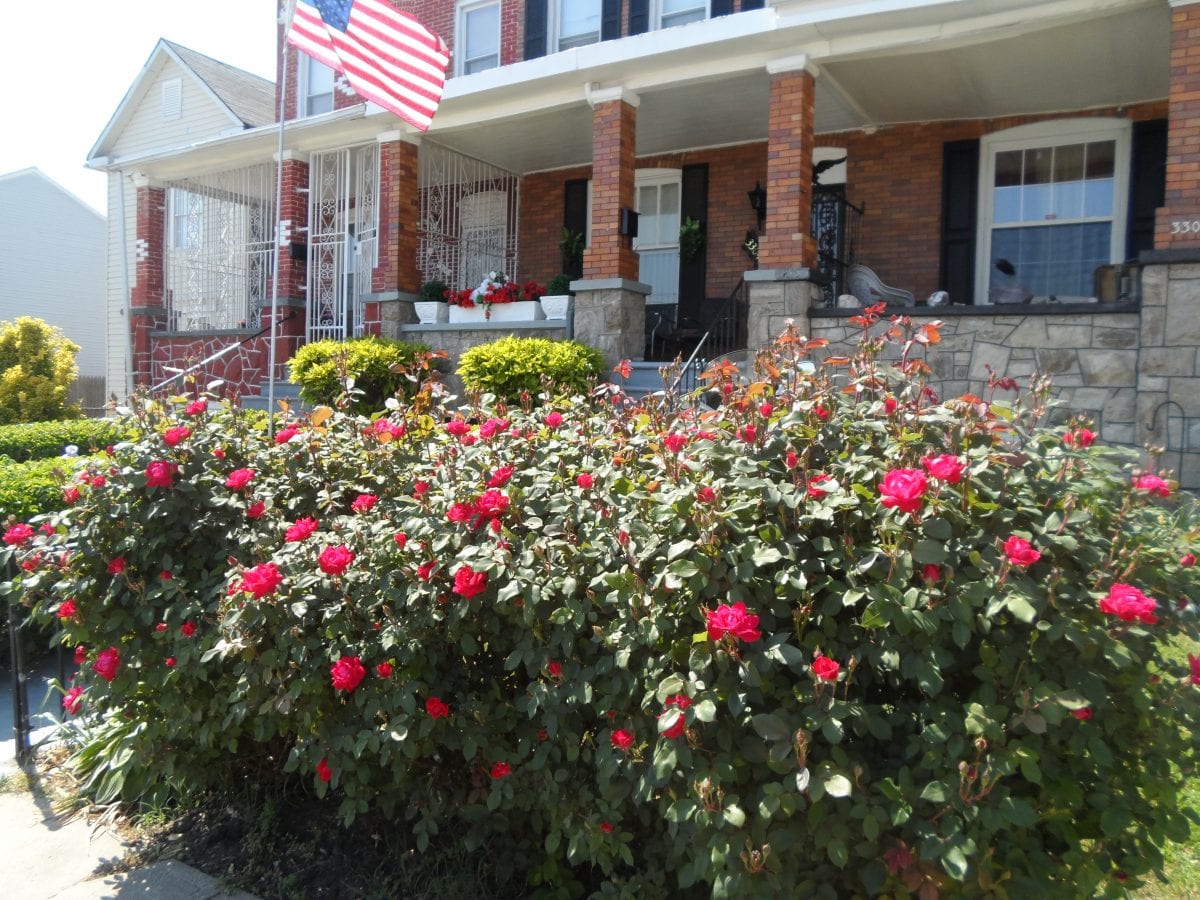


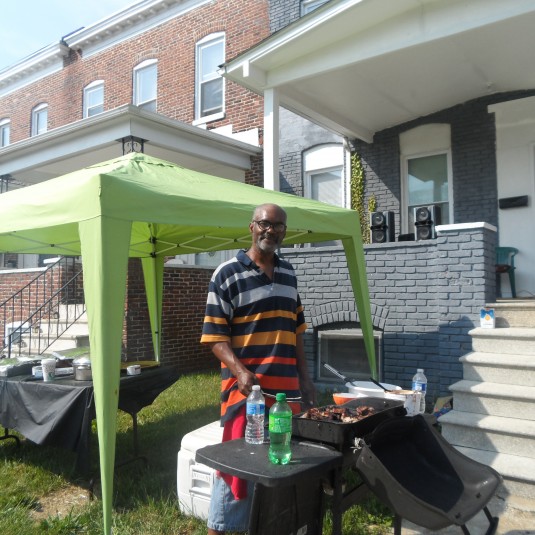
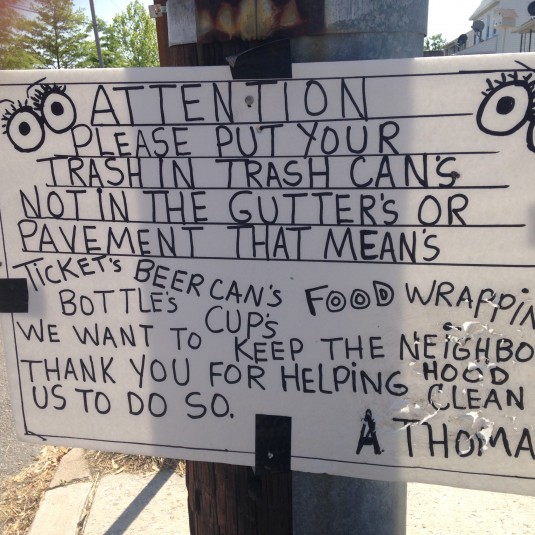
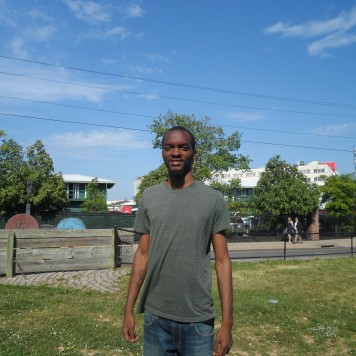
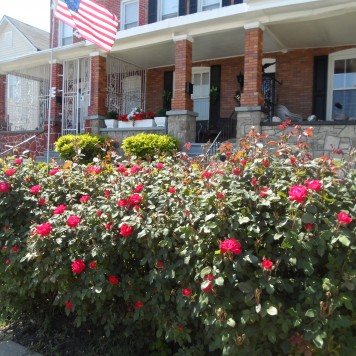
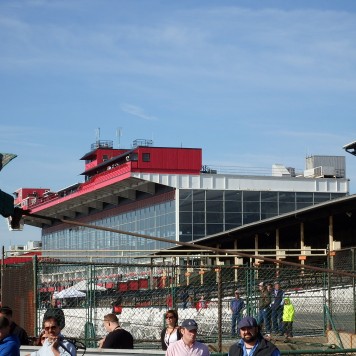










nice story TG..
Thanks, Hugo.
If the standard of success for that neighborhood is “I’ve never had a gun pulled on me,” it’s even worse off than even I thought.
I hear the local politicians are claiming that the Stronach Group can’t move the Preakness within Maryland to Laurel without their permission (read – “pay us off”). They may have a bad surprise in store if the Preakness moves to Santa Anita.
Thanks for weighing in,folks. Horseman, you’ve been pretty clear regarding your feelings about Pimlico, but as someone who’s been going there regularly for more than 20 years, I can say in all honesty that I’ve never had even the whisper of a suggestion of a problem: no break-ins, no squeegee men, no trepidation, no nothing. The neighborhood is substantially better than you have portrayed it in your comments.
On the other issue: it’s not local politicians claiming it, it’s actually a 30-year-old state law that requires the race be run at Pimlico. The Stronach Group has said repeatedly that the Preakness will remain in Maryland, and the state of course has tools that would make moving it out of state challenging, at least.
You’ve proven your adeptness at selective reading, and for offering opinions without the courage to put your name to them. Good, perhaps, for Maryland racing that you’re in Virginia.
On the issue of Pimlico and its neighborhood, we’re going to have to agree to disagree!
As someone who has run more horses in Maryland than you have likely ever seen run in the state, I can say that it’s good for Maryland racing that you and your byline are based in New York!
Dear Teresa and Frank,
Wanted to let this thread go, but came across something this morning which puts Pimlico and its neighborhood in perspective.
Pimlico sits in zip code 21215. In reviewing today’s Baltimore Sun, I noted that they published an interactive map whereby you can search for Baltimore homicide victims by a number of criteria, including the zip code where they were killed.
The link is here: http://data.baltimoresun.com/bing-maps/homicides/index.php?range=none&district=all&zipcode=all&age=all&gender=all&race=all&cause=all&article=all&show_results=Show+results
The numbers for the Pimlico area:
2015 to date: 15 murders
2014: 33 murders
2013: 26 murders
2012: 19 murders
2011: 17 murders
2010: 27 murders
So, while I understand you are vested in publishing a narrative to the effect that “Pimlico sits in a nice, but misunderstood neighborhood,” I hope you appreciate that other people’s differing opinions aren’t based upon ignorance of the actual facts on the ground (or the bodies on the ground, as the case may be).
Horseman,
I take strong exception to the notion that we “are vested in publishing a narrative that…”
We are not.
The two stories that Teresa has done on this topic – both of which, by the way, are exceptional pieces of journalism – are stories of Baltimore as told by Baltimoreans. The latter story she got by walking around the neighborhood outside the track on Preakness weekend and talking to people (something a lot of us could probably benefit from) living and working there. If everyone had said, “Oh boy, this is one dangerous neighborhood, and you’re crazy for being out here,” there would have been a different story; but that’s not the story they told.
It’s also worth pointing out – and anyone who’s lived in a city knows this – that you can have dramatically different neighborhoods within a single zip code. In fact, you can have dramatically different neighborhoods from one block to the next. That’s unfortunate, but it’s also true.
I guess I will leave it with this: the statistics you cite, and the incidents you complained about (e.g., squeegee men), are data points about Pimlico and its neighborhood. They are, as it happens, almost the only data points that ever get used in discussions of Pimlico, but they are not the only data that exists.
If we had one agenda in these stories, it was simply this: to give the people who live there a chance to tell their stories to help build a deeper and richer picture of the track and its neighborhood. How people interpret that, and what they do with the information, those are up to the individual. But before we condemn a place as a “dangerous slum,” as some have done, it might behoove us to hear the voices of those who live there.
As always, thanks for reading and taking the time to comment.
Frank
Not much to add to what Frank has said, in which he states pretty clearly what I think as well: there’s a dominant narrative about Baltimore and the area around Pimlico, and it’s selective and reductive. I wanted to see how true it was, and I reported the story I found–which I will admit did not surprise me.
As for those statistics: I’m going to guess that few, if any, of those poor murdered souls belongs to middle-class or affluent white people, which make up the vast majority of the Preakness audience. As I’ve stated often, people going to the Preakness aren’t the ones who need to be worried about their safety, despite their hand-wringing about the “bad” neighborhood. It’s the residents of Baltimore that we should be thinking about, not the people who drop in once a year for a few hours.
John Angelos, Chief Operatiions Officer of the Orioles, has a perspective the Virginia Horseman may find interesting. Maybe he can find it. Should be a snap for someone so accomplished.
And as it happens, we can make it easy, because we published a story on that before the Preakness, including a conversation with Angelos. https://www.theracingbiz.com/2015/05/07/why-has-this-happened/